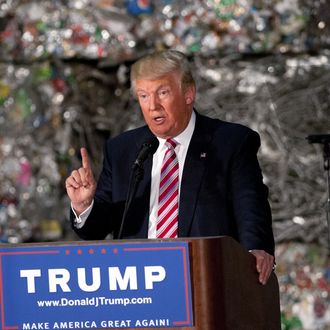
The small universe of potential Donald Trump running mates may have gotten a lot smaller last week when the mogul delivered his vein-charring over-the-top attack on free trade and globalization, followed up quickly with a sharp rhetorical exchange with the U.S. Chamber of Commerce.
As Margaret Hartmann noted on Friday, it’s hard to find much of anyone in the political universe who seems to lie awake at night dreaming of becoming Donald Trump’s running mate. It’s a gig with all the hallmarks of being a dead end and a bummer, to boot. If Trump loses badly, he will go down in Republican history as a cautionary tale for the ages, and his partner in political malfeasance will be lucky to be forgotten (like Barry Goldwater’s 1964 ticket mate William Miller). If Trump somehow wins, being the second fiddle to America’s leading narcissist cannot be much fun. If his policies have the most likely effect of tanking the economy and even further dividing the country, Republicans will be plotting to destroy all of his administration’s works as his veep stands by helplessly. The path to anything other than disaster will be very narrow.
But identifying oneself with the Boss as intimately as a running mate must carries a fresh peril now that Trump has all but declared war on the U.S. Chamber of Commerce and other business groups that don’t understand that the trade agreements they have promoted relentlessly for the last several decades have destroyed America and betrayed its workers.
Aligned with the Chamber and its allies on trade and investment issues are K Street, Wall Street, and most Main Street Republicans, the latter populating the state and local Chambers of Commerce that often share the national group’s point of view and lobbying positions. Beyond the towns, there are the many agricultural interests that have supported the trade agreements Trump excoriated. With relatively few exceptions, Republican pols at the statewide or federal level have reflexively supported the business community’s trade agenda since the early 1970s. With even fewer exceptions, conservative think tanks and academics regard free trade as a no-brainer. Yeah, there have been the occasional “populist conservatives,” like Rick Santorum and Mike Huckabee, who have expressed displeasure at globalization’s impact while supporting most actual trade deals, and the rare out-and-out protectionist pariah like Pat Buchanan (whose 1998 anti-globalization jeremiad, The Great Betrayal, appears to have influenced Trump’s own positions). Support for trade-expansion measures hasn’t been quite as obligatory in the GOP as, say, opposition to legalized abortion; for one thing, it’s always been acceptable to kvetch about the trade negotiation and enforcement efforts of Democratic administrations. But the kind of full-frontal assault on the very idea of free trade remains “out there.”
So unless Trump engineers a massive sea change in the Republican views, anyone who joins his ticket will very likely sacrifice future support from elected officials, donors, and grassroots conservative activists as well. Sure, Republicans who simply support Trump with varying degrees of enthusiasm can give themselves a mulligan on this and other issues. But not his running mate, and not on this issue so central to Trump’s worldview.
How many potential veeps can and will make this great leap backward to the view of the Republican — and before that, Whig — protectionists of the distant past? The inveterate paleo-conservative Jeff Sessions is already there, though selecting him as the veep would be a sign of Trump campaign inbreeding so egregious as to inspire widespread GOP despair. So far Newt Gingrich has been the one potential running mate to execute a full recantation on trade, and what a big, looping full-gainer it has been, given Newt’s pivotal role in the passage of NAFTA and early and loud support for bringing China into the world trading community (he is, of course, a very flexible pol who began his career in Nelson Rockefeller’s 1968 presidential campaign). Beyond that, it’s tough sledding to find a viable option.
Sen. Bob Corker took himself out of the running just today, reportedly telling Trump he was not temperamentally suited to be an attack dog. You have to wonder, though, if Corker’s outspoken support for the Trans-Pacific Partnership was a factor. Sen. Joni Ernst, a recent addition to the ranks of The Mentioned, went out of her way to disclaim interest as well, with the air of someone heading off an unwelcome date request by announcing plans to reorganize the sock drawer. Again, perhaps it was not a factor, but Ernst actually campaigned against her Democratic opponent’s anti-trade voting record when she was elected to the Senate in 2014.
Are Trump’s vetters pretesting the willingness of Veep prospects to slavishly follow him into rank heresy on international economics? If not, will the vice-presidential nominee be kept out of the Rust Belt states where Team Trump clearly intends to make Hillary Clinton’s association with her husband’s pro-trade administration a major talking point?
All in all, it makes more sense for ambitious young Republican pols to endorse Trump and then take a long summer vacation, with perhaps an Indian-summer chaser. They could leave the maximum sacrifice of going on the tycoon’s ticket to septuagenarians like Newt who have nowhere else to go.






























